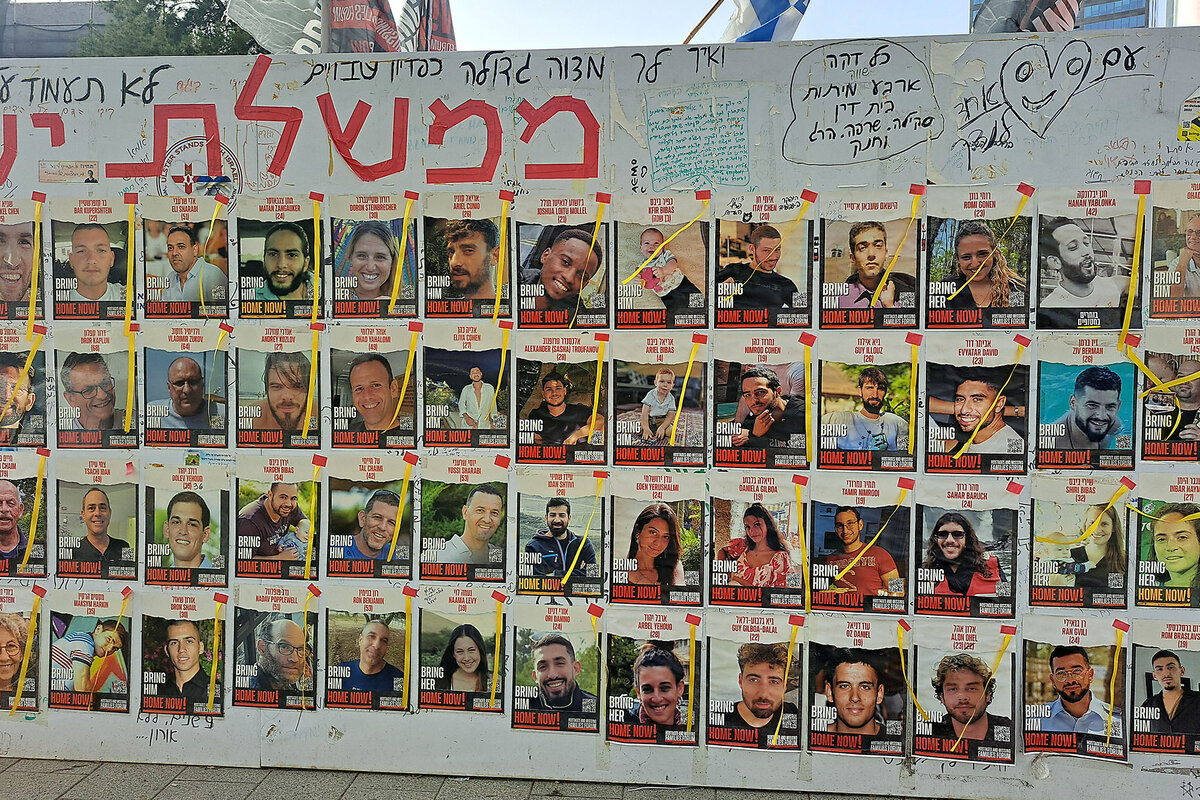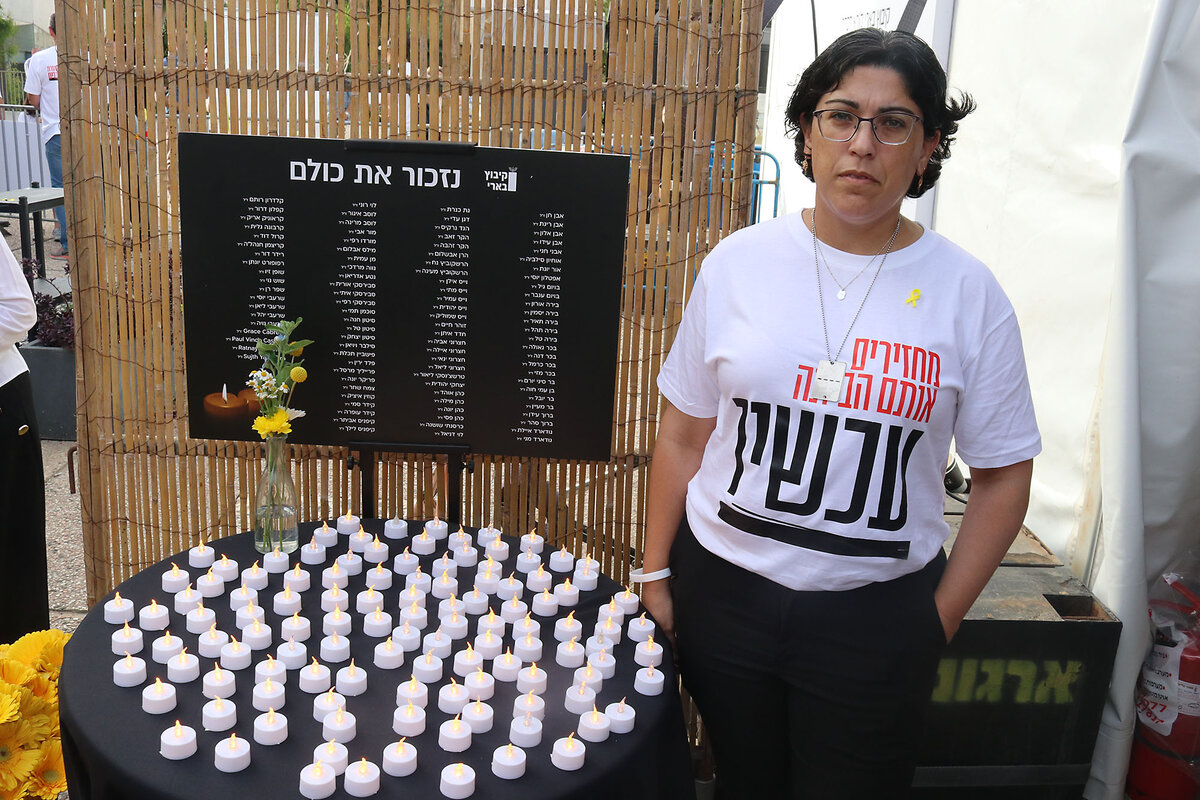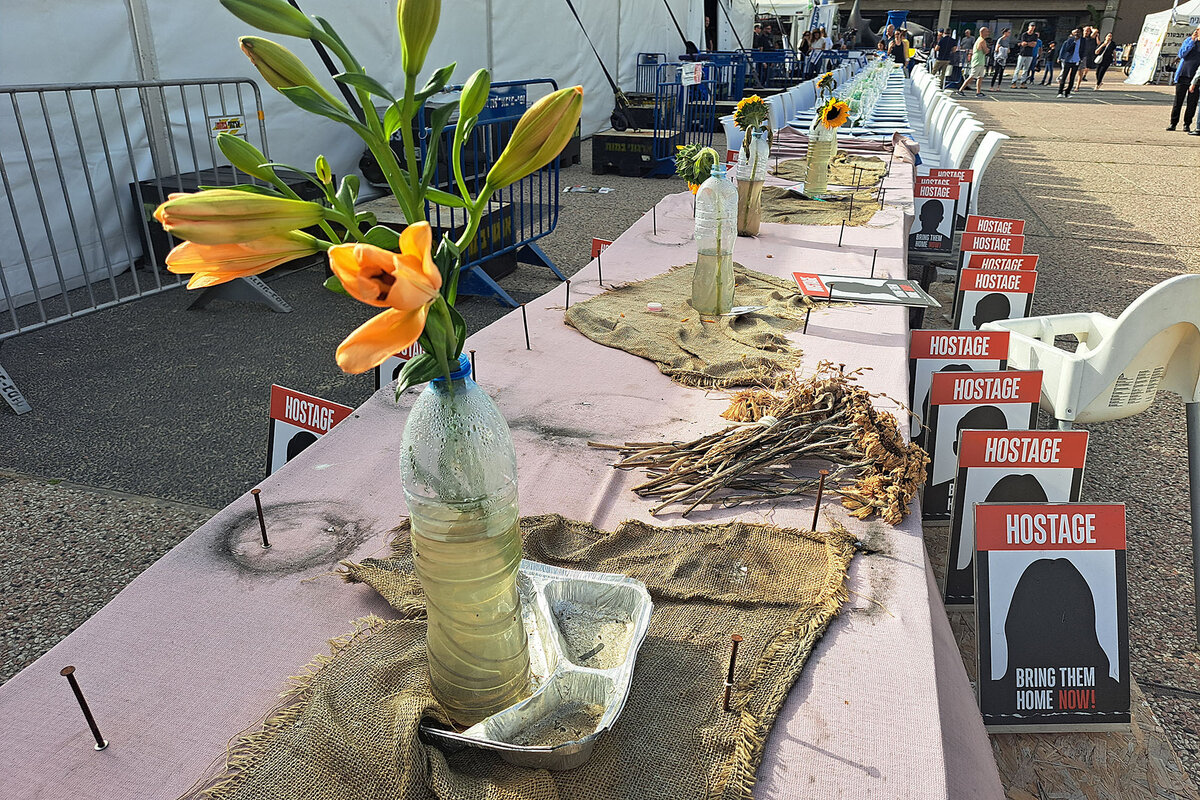‘Out of captivity.’ When will Passover’s promise reach Gaza hostages?
Loading...
| Tel Aviv, Israel
At sundown Monday evening, as hundreds of Israelis sat down to the Jewish Passover ceremony, the Seder, in Hostages Square in downtown Tel Aviv, a digital clock loomed over them.
One hundred ninety-eight days, 11 hours, nine minutes, and three seconds, it read. The length of time that had elapsed since Hamas assailants seized more than 240 Israeli hostages Oct. 7, to hold them captive in Gaza.
Passover is a seven-day festival of liberation marking the Israelites’ delivery from captivity in Egypt, as recounted in Exodus. This year, Seders up and down Israel were dominated by thoughts for those still being held prisoner.
Why We Wrote This
Passover celebrates the Israelites’ delivery out of captivity in Egypt. In Israel, Monday evening’s ceremonies were muted by uncertainty surrounding hundreds of Hamas-imprisoned hostages.
“How can people celebrate a holiday of freedom?” wondered Daniel Lifshitz, whose 84-year-old grandfather Oded was kidnapped from his home and remains in Hamas captivity, as hopes for his survival fade. “We are still being held hostage, every one of us in our own way.”
The circumstances made the evening meal marking the start of Passover a ceremony of reflection, grief, and solidarity.
Israelis said they were divided into two camps: those who found it almost impossible to celebrate, and others who saw the holiday as a moment in which to look for hope.
A Seder marked by absence
Both groups were represented among the 500 members of Kibbutz Be’eri who held their Seder in a giant tent in Hostages Square, which has been transformed into a memorial to the hostages and the epicenter of hostage family activities and protests.
One hundred members of the tightly knit kibbutz were killed during the Hamas fighters’ brutal rampage, and others were kidnapped.
Men and women carried bunches of yellow daffodils, carnations, and sunflowers, passing them out to visitors and placing them on the array of circular banquet tables that filled the tent. A Passover-themed color representing joy, yellow is now synonymous in Israel with hostages; on Monday evening, the flowers represented hope for their release.
“This is a statement that we are fighting to be ourselves and continue our traditions and our lives, even with the big loss of our people,” said Noam Yitshaky, a Be’eri kibbutz member, shortly before the Seder.
“We are balancing these two messages: We can’t go on with our lives, but at the same time we are fighting to survive.”
Several of the hostages who returned to Israel in November took part, but it was a Seder marked by absence – the absence of husbands, wives, and friends killed; of parents and children missing; of homes burned to the ground.
Of the 17 Kibbutz Be’eri members still held in Gaza, only 11 are believed to still be alive.
This year, the kibbutz added an additional query to the four questions normally sung by the youngest member of the family at the beginning of the Seder to spark discussion of Passover’s importance.
The fifth question: “Why are our loved ones not sitting at the table with us?”
Food, people, blessings – but no holiday
At moments during the ceremony, participants turned to a large video screen that showed film shot at previous Seders, featuring Be’eri residents – now dead or missing – singing and reading.
They gathered as Israel’s war in Gaza, which has killed an estimated 34,000 Palestinians and sparked a famine, has shifted media attention away from the suffering of Israeli families. Talks in search of a cease-fire and hostage release have ground into stagnation. Trust in the Israeli government, which many here believe has become indifferent to their plight, is low.
Outside the Be’eri communal Seder tent, as sunset neared, hundreds of Israelis gathered in solidarity, setting up plastic tables laden with food, or laying out picnic blankets.
Some were relatives of hostages and the deceased; others were Israelis who felt that the only way they could mark Passover was by honoring the hostages. Some bystanders simply stood and wept.
With more than 100 hostages still in Hamas’ hands, and little news of whether they are alive or dead, these families – and a nation – are held captive by Oct. 7.
“What freedom? What liberation? Every one of us is being held captive by Hamas,” one woman lamented. “We might as well still be slaves in Egypt. We feel that helpless. This is why all of Israel needs to be together at this moment.”
“There is food, there are people gathered, but this is no holiday,” said Doron Zexer, host father for American Israeli soldier Edan Alexander, still held by Hamas. “This is a meal, but it is not a celebration.”
At the end of the Seder, as guests poured their fifth and final cup, hostage families and strangers recited a prayer in unison.
May it be
That within every hostage
All tongues of redemption will be found
I will bring you out – I will deliver you – I will redeem you – I will take you – I will bring you unto the land
And they will all be able to return to the embrace of their families, safe and sound,
And we will be able to welcome them with incomparable joy
Soon in our day.
“Together,” said Ms. Yitshaky, “we will keep each other strong until that day comes.”









